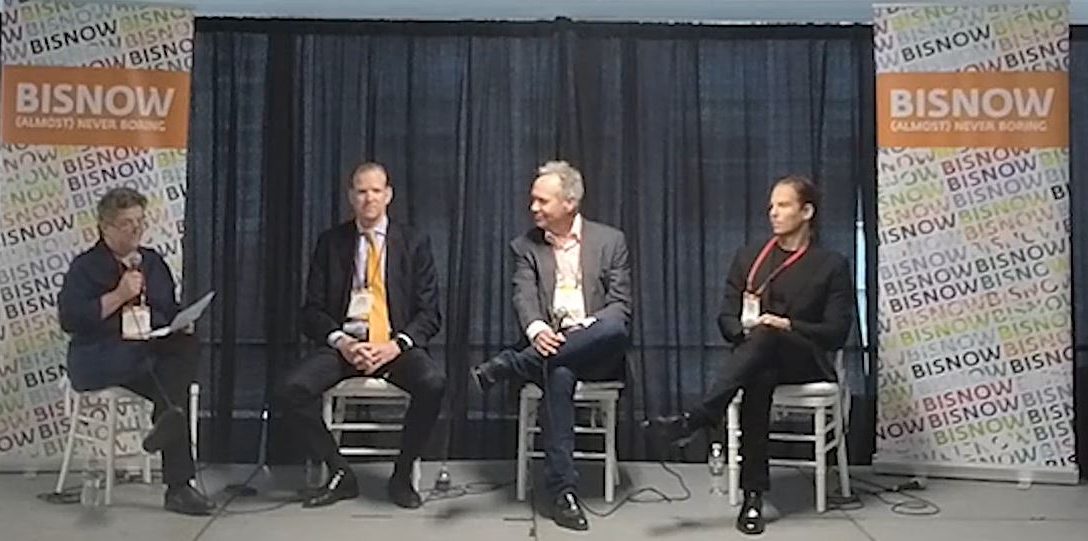Amenity-rich buildings become a key focus in enticing employees back into the office, supply chain links are strained by a lack of storage capacity in warehouses and port areas, green lease signings are on the uptick, and more.
Building Amid the COVID Challenge
 At longtime client Clark Construction, Dave Beck took charge of risk management just weeks before the COVID-19 pandemic struck.
At longtime client Clark Construction, Dave Beck took charge of risk management just weeks before the COVID-19 pandemic struck.
David Beck made a big career move last year—just how big, he soon learned. In January 2020, Beck became division president for risk management at Clark Construction Group, a major national builder based in Bethesda, Md., with more than 4,000 employees across the U.S. In business since 1906, Clark has grown from a small, local excavator into one of the country’s best-known providers of construction services.
Real Estate & Construction News Round-Up (10/27/21)
Commercial real-estate sales surge in the third quarter, blockchain-integrated real estate is poised to span into new sectors, a major home builder is teaming with a Texas startup to create a community of 100 3-D printed homes, and more.
How to Lose Your Contractor’s License in 90 Days (or Less): California and Louisiana
Having your Contractor’s License up and running to perform work when needed, where needed, is an indispensable compliance matter that contractors face every year. However, this indispensable process may also be cumbersome and time consuming. Knowing the regulations applicable to your business in each state and what to do, how to do it, and when to do it, is of critical importance to maintain compliance and your ability to work in different states.
In this post we will do a high-level review of reporting obligations in California and Louisiana.
Bay Area COVID-19 Rules Tracker
Our Bay Area COVID-19 Rules Tracker summarizes the face-masking requirements currently in effect around the San Francisco Bay Area that apply to business and office settings. Though many of the Bay Area counties have adopted similar or identical masking and isolation/quarantine rules, there are some key differences between the requirements in place in each county. This chart will be updated periodically as local rules and conditions evolve.
‘Spotlight for Good’ Series for Construction Pro Bono Efforts
Laura LoBue, a Litigation partner in Pillsbury’s Construction Counseling & Dispute Resolution practice, was featured in Building for Good (B4G)’s attorney spotlight series ‘Spotlight for Good,’ which was recently showcased by the American Bar Association’s Forum on Construction Law.
In 2019, LoBue joined Building for Good, launching its services in D.C. and establishing Pillsbury’s ongoing partnership with the organization. LoBue is a significant volunteer resource for Wildflower Schools pro bono projects as they go from conception, through construction, up to operation. In addition, she is a member of B4G’s Development Committee and helps to grow its fundraising platform in the D.C. area. Read LoBue’s full feature here.
Finding Investment Opportunities in Pandemic-Challenged Sectors
Partner Caroline Harcourt recently moderated Bisnow’s panel, “High Risk, High Reward: Finding Investment Opportunities in Pandemic-Challenged Sectors” panel on Tuesday, October 5. Topics covered identifying the key components to maximize returns on your next deal and insights on contrarian philosophies in opportunistic investment opportunities. In case you missed it, click here to view the recording.
Topics covered identifying the key components to maximize returns on your next deal and insights on contrarian philosophies in opportunistic investment opportunities. In case you missed it, click here to view the recording.
Environmental Justice: A Legislative and Regulatory Update
Environmental Justice, as an urgent policy priority of the Federal Government, dates back to 1994, and President Clinton’s issuance of Executive Order 12898. This order directed federal agencies to identify and address, as appropriate, “the disproportionately high and adverse human health and environment effects of its many programs, policies, and procedures on minority populations and low-income populations.” Executive Order 12898 supplements Executive Order 12550 (1980), whose primary legal basis was Title VI of the Civil Rights Act of 1964, in particular, Sections 601 and 602, which prohibit discrimination in programs and activities receiving federal financial aid and assistance.
Over the years, the Supreme Court has reviewed the scope and importance of Title VI. For example, in Alexander v. Sandoval, decided in 2001, the Court concluded that while private parties could sue to enforce Section 601 or its implementing regulations, Section 601 only prohibits intentional discrimination; which is very difficult to prove. In addition, the Court ruled in Sandoval, that private parties cannot sue to enforce regulations implementing Section 602. Perhaps as an acknowledgement of these shortcomings, the Environmental Protection Agency (EPA) has for many years operated an administrative system to process environmental justice complaints (see 40 CFR Part 7). The process is complex and the results—usually whether a state agency has failed to uphold Title VI—have generally been unsatisfactory. To be successful, many proponents of environmental justice believe that a statutory foundation must be established, and significant efforts have been made to do so.
Recent Regulatory Activity
Selected federal regulatory actions taken or proposed by several federal agencies, including the Environmental Protection Agency:
Bay Area’s Office Market Recovery
Partner Rachel Horsch recently moderated Bisnow’s panel, “Recovery of the Bay Area’s Office Market“. Topics covered how office spaces are evolving to accommodate for changing workforce needs, such as changing layouts, offices in residential buildings and hybrid work. Panelists discussed these topics, showcasing their most innovative projects and shed light on the future of the market in the Bay Area. Click here to view the recording.
needs, such as changing layouts, offices in residential buildings and hybrid work. Panelists discussed these topics, showcasing their most innovative projects and shed light on the future of the market in the Bay Area. Click here to view the recording.




